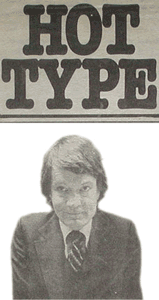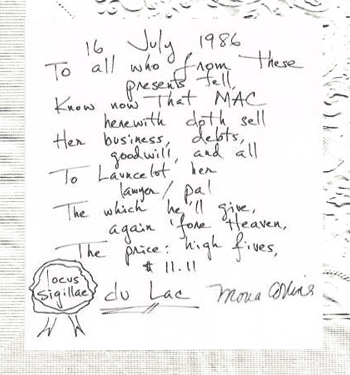| H1

|
Haddix, Lance
 
|
Daley is Questioned on police spying of community groups Michael Hirsley
Mayor Daley spent 2.5 hours Saturday answering questions about his knowledge of police spying on community groups. Daley was in a jovial mood as he left the meeting in Room 1509 of the La Salle Hotel with three lawyers from the Alliance to End Repression. The Mayor called the session "a fishing expedition," and when asked if attorneys Rick Gutman, Lance Haddix, and Val Klink had caught any fish, a chuckling Daley replied, "No, they didn't, I answered all the questions." As he departed for a State Street parade, Daley said the meeting had been cordial, "We had a great time," he said chuckling. Attorneys Gutman and Klink verified that Daley had answered all questions, and said the deposition was complete.
A major unsettled issue, however, is whether the questions and answers can be made public. The city has asked for a court protective order against making public any aspects of the deposition; Alliance attorneys are fighting the city's request. While the question is in litigation, the attorneys said, they have agreed not to discuss anything substantive about their questions or the mayor's responses.
Daley's attorneys at the meeting were Corporation Counsel William Quinlan and Earl Neal, special assistant corporation counsel. When reporters sought admittance to the session, the mayor's bodyquards said Quinlan had told them "court procedure" deemed that the press be banned. Questioning began about 9am. It was recessed at 10:15am so Daley could attend a baseball clinic with White Sox players, and then resumed from 11am until shortly after noon.
Judge Alfred Y. Kirkland of Federal District Court had ordered Daley to give the deposition. The judge had acted on a civil suit brought by the Alliance charging the Chicago Police Department with spying, burglarizing, wiretapping, and improper surveillance against private citizens, seeking $400,000 in damages. It recently was made a class action suit to encompass all community groups alleging police spied on them. The Case is in a discover stage and it could be more the a year before a trial begins, Klink said. Sources in the Alliance said representatives of the mayor's office tried repeatedly last week to change the meeting place for the deposition. Attorneys for the group rejected a plan to take the deposition in the corporation counsel's office, sources said. The Meeting began much like a Marx Brothers spoof of a detective film. Attorney's Klink, Gutman, and Haddix had not been told exactly where in the hotel they were to meet Daley, so they waited in the lobby.
Haddix, who had taken a room at the hotel, awoke late and, fearing he would miss the rendezvous, arrived in the lobby still in sleeping attire - a black and white checked robe over his pajamas, slippers, a gold ascot, and a black sleeping mask around his neck. At 8:40am a representative from the mayor approached the three lawyers seated on red couches in the lobby.
"Where is Mr. Haddix?" he asked.
"Right here," replied the robed attorney.
"Oh, I didn't recognize you," the mayor's representative said.
When informed that the mayor was in Room 1509, Haddix went to his own room and changed into a suit. |
| If you make a point of following the major news stories of the day, then you no doubt remember the flood of publicity that engulfed the notorious Red Squad spying case a couple years back - a suit that is, incidentally, still dragging its way through federal court. But even if you just stick to the minor news stories, you'll likely recall the imaginative use that reporter Rob Warden has been making of the Freedom of Information Act - obtaining juicy, hitherto unobtainable files and exposing the facts for an ever-hungry public-as reported in this column.
For that matter, if you sell flowers or pencils on Chicago's sidewalks, you may even have heard of the pending suit that would force the city to change its zoning regulations and allow peddlers into the Loop.
The sure bet is that you don't know the one guy who figures prominently in all of the above, as well as a few more causes celebres on Chicago's legal landscape. Chances are, however, that if you scratch some of antirepressive litigation, you'll find a 39-year-old lawyer named Lance Haddix, an unlikely cross between Crusader Rabbit and Philip Marlowe, with a dash of Walter Mitty tossed in for laughs.
Haddix was one of four lawyers involved in public hearings that eventually led to the filing of the Red Squad suit. "In 1972," he said, "the four of us- Val Klink, Howard Eglit, Richard Gutman, and myself- conducted these sessions on police misconduct for our own interest. But what soon became apparent was the constant complaint, no matter what group was testifying, about police spying." It bothered him, too, that he was a member of many of the griping organizations-the ACLU and the Alliance to End Repression, for two -and that, in his words, "it had to be more than coincidence."
It took most of two years, but eventually Haddix et al. felt they'd uncovered enough to file suit-even though they had no backing, no funds, and no real plaintiff. "Then all these groups-the Better Government Association, Business and Professional People in the Public Interest. Operation P.U.S.H.-jumped on the bandwagon, and formed a coalition that became the plaintiff. It was definitely a case of the egg coming before the chicken." As the work load on the case mushroomed, the original four lawyers split their efforts into specific areas, with Gutman being retained by the Alliance and becoming the most visible of the bunch; the others are still involved with various side issues.
The Freedom of Information case was a good deal less convoluted: "One day Warden and I got to talking and comparing notes, since we had both been interested in the FOI proceedings for some time. He mentioned the tough time he was having in getting the files he wanted, and I told him that if it snagged again, the thing to do was file a civil action to compel the government to hand 'em over." Which is exactly what he did.
Haddix started out in Kentucky, majored in English at the U. of C., got his law degree at Wayne State in Detroit, and returned to Chicago. He didn't start his life in crime immediately. Instead, he went to work as a bank trust officer. "I wanted to be a banker, Haddix mused, "but I got tired of pushing mortgages and trusts around the top of my desk." So he began what he calls "a sort of Walter Mitty existence; I went down and volunteered my services as a public defender in criminal cases." The bank offered plenty of support for his public-mindedness until Haddix was assigned a case involving some Black Panthers; he decided to leave the bank rather than quit the case.
(Actually, his public defender work wasn't far removed from an earlier volunteer outlet, the Cook County Special Bail Project of '68: Haddix and others had offered their services in springing the protesters who were mass-jailed after the Democratic convention. "That was viewed as subversive," Haddix commented; some time into the Red Squad case, it proved to be motivation for a dossier that was kept on him.)
At this point, Haddix is willing to concede that there are a few other lawyers interested in the kinds of cases that have fascinated him (which also include the several actions he has filed against city and state election boards, one of which reached the Supreme Court last fall). But he concedes, "I don't think anyone quite covers the waterfront like I do."
It's with that kind of comment that Haddix most clearly signals memories of Marlowe, Raymond Chandler's tough, straight, purist detective. Like Marlowe, Haddix doesn't seem to mind getting into impossible fights with the establishment; like Marlowe, he's almost embarrassing in his doggedness. And like Marlowe, he supports this "one-man activist show" with the bread-and-butter work of his profession: wills, real-estate closings, and the sometime promotion of the book he put together, How to Do Your Own Illinois Divorce.
Only difference is, Marlowe didn't do divorce work.
--- Neil Tesser, THE READER, January 26, 1979,
Michael Weinstein - photo
|
|
|
|



